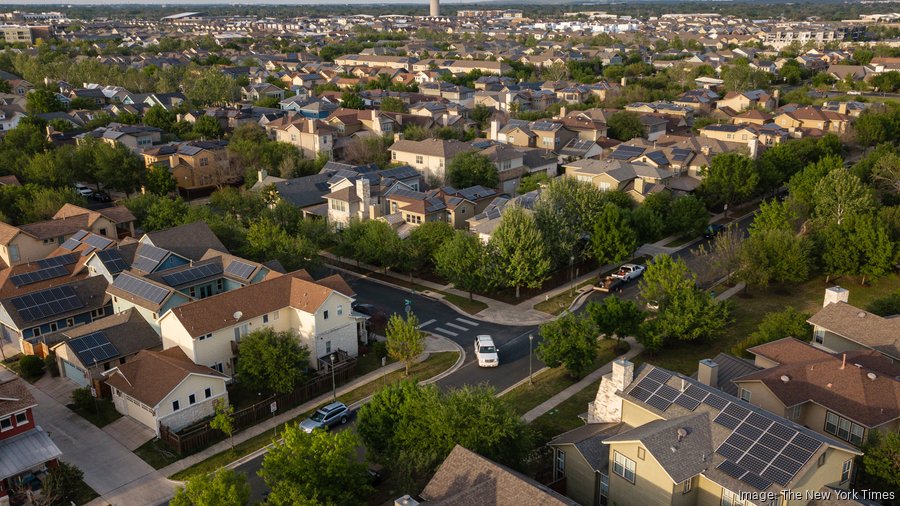Listen to this article 3 min
Welcome to The National Observer, a roundup of top business news and actionable insights from across The Business Journals. We'll take a look today at the first bank failure of 2024, the last big broker to settle a class action lawsuit over broker fee arrangements and turbulence in the marina industry. But first, we're looking at the build-to-rent sector's blockbuster growth in 2023.
Get more stories like these every day in your inbox by subscribing to The National Observer newsletter.
Build-to-rent had biggest growth year yet
With 27,500 build-to-rent houses delivered, 2023 was the biggest growth year on record in the sector, according to a new report from RentCafe. That number is 75% higher than the prior year nationally, with 14 of the 20 highest-producing metros seeing 10-year local highs, reports Janelle Ward of the Atlanta Business Chronicle.
TOP OF THE LIST: Not surprisingly, Sun Belt markets are fueling the trend, with Phoenix and Dallas leading the way among the top 10.
GROUND LEVEL: In Atlanta — No. 3 for BTR completions in the nation last year, according to the report — the build-to-rent model has thrived across the suburbs and exurbs. The formula mostly appeals to residents who crave a flexible living arrangement and a sense of community, but who can't or don't want to own a home. Homeownership is becoming harder to achieve for the typical working- or middle-class household as the cost of buying a home gets more expensive.
RISING COSTS: Home prices have trended upward in the past year, both locally and nationally. The median sale price for a home in metro Atlanta rose 2.5% from February to March and nearly 8% year-over-year, according to market data from the Atlanta Realtors Association. Freddie Mac reports 30-year fixed mortgage rates averaged 7.17% for the week ending April 25 — up from 7.10% in the prior week.
FULL STORY: Build-to-rent market set for robust growth in 2024, per report
Rough waters ahead for marina business
Marinas across the country saw a surge of interest during the Covid-19 pandemic, as consumers were forced to change where and how they spent their money. That popularity drove big returns for investors at the time, reports Andy Medici of The Business Journals.
Now, however, the sailing isn't so smooth.
FUTURE SUPPLY: Many marinas still boast full waitlists, but there's an extremely limited supply of new marinas on the way — meaning the industry is facing a collective challenge in the years to come for how it will keep up with demands from boat owners.
NUMBERS: Just 34 new marinas delivered from 2023 to 2024, bringing the total to 11,305 marinas, roughly the same number as existed in 2009, before the Great Recession forced some to close. Meanwhile, many local governments, citing environmental concerns and concerns about boat traffic, have blocked or placed moratoriums on new marinas across the country — further limiting supply at a time when boat ownership has soared.
BIG BOATS: Owners of larger boats in particular are struggling to find marinas that can accommodate them, as many marinas are unable to take boats beyond a certain size, and there is very little in terms of new development to accommodate them, said Jeff Spilman, vice president of investments at Leisure Investment Property Group.
FULL STORY: Marinas saw a rising tide during Covid. It's no longer smooth sailing.
Final big broker settles class-action lawsuit
The Warren Buffett-owned Berkshire Hathaway HomeServices of America has become the last big real estate company to strike a settlement deal — at $250 million — in an ongoing class-action battle over real estate agent commissions, reports Andy Medici of The Business Journals.
BACKGROUND: The fight over what plaintiffs alleged to be a widespread conspiracy to keep real estate broker fees high led to a wave of lawsuits across the country and a jury verdict of $1.78 billion in Missouri in November against HomeServices of America and other big brokers. Experts have said the settlements will transform the industry, although to what extent remains to be seen.
INDUSTRY PEERS: Other large brokers already agreed to nationwide settlements, leaving HomeServices of America as the sole defendant. This settlement is in addition to the $418 million settlement reached with the National Association of Realtors on March 15, 2024, and more than $275.25 million in other settlements reached with Anywhere Real Estate, RE/MAX, and Keller Williams in 2023 and Compass and Real Brokerage Inc. in 2024, bring total settlements, pending court approval, to more than $943.25 million.
FULL STORY: Another real estate titan settles commission lawsuit, but big questions remain
Republic First is the first bank failure of 2024
The Federal Deposit Insurance Corp. stepped in at the end of last week and seized struggling financial institution Republic First Bancorp, reports Jeff Blumenthal of the Philadelphia Business Journal.
WHAT'S NEXT? The FDIC arranged for Fulton Financial Corp. to assume Republic First's assets and obligations. Republic First's 32 bank branches were set to reopen on Saturday and today as branches of Fulton Bank.
BIG PICTURE: Republic First is the first U.S. bank to fail in 2024 following three high-profile failures last year. Republic First has been in turmoil for more than two years and reached a crossroads earlier this year when it lost a second chance at a capital raise in less than a year.
BALANCING THE BOOKS: As of Jan. 31, the FDIC said Republic had approximately $6 billion in total assets and $4 billion in total deposits. The FDIC estimated that the cost to the Deposit Insurance Fund will be $667 million.
FULL STORY: Republic First fails; FDIC sells bank's assets to Fulton Financial





